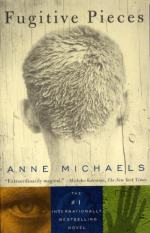
|
| Name: _________________________ | Period: ___________________ |
This test consists of 5 short answer questions, 10 short essay questions, and 1 (of 3) essay topics.
Short Answer Questions
1. What effect does hearing the old tongue have on Jakob?
2. Of what is Athos the last?
3. What reminds Jakob of his mother and Bella?
4. How does Jakob approach listening to composers?
5. What does Jakob witness as he is hiding?
Short Essay Questions
1. How does Athos cause Jakob to understand the power of poetry?
2. What does Jakob think concerning the dead?
3. What does Athos teach Jakob to cook, and why does Jakob stop going to the grocery store?
4. Why do Athos and Jakob identify with explorers of Antarctica?
5. What is Biskupin and what happens to it?
6. How does the relationship between Alex and Jakob evolve?
7. What is Toronto like and where do Athos and Jakob go to live?
8. What does Athos do and say before he and Jakob leave for Canada?
9. How does Jakob learn English, and of what is he proud as he is mastering the language?
10. How does Jakob meet Alex?
Essay Topics
Write an essay for ONE of the following topics:
Essay Topic 1
Titles often play a vital role in making a person decide to read a particular book. Discuss the following:
1. Fully explain why you think "Fugitive Pieces" is titled as such. Do you think it is the best title for the book? Why or why not? Can you think of a better title? Why would you choose it?
2. How important is a title in influencing you to consider reading a book? Explain your answer.
3. Do you think a title needs to have direct relevance to a book's content? Explain your answer.
4. Have you ever read a book that when you finished, you do not understand the relevance of the title? Does it discourage you from "trusting" that particular author again?
Essay Topic 2
Jakob emphasizes that he does not see the horrors that visit European Jewry during World War II while he is living in Greece. He endures hardships on Zakynthos and lives in constant fear of the door being bashed in, as had happened in his home in Poland. All of Zakynthos's Jews are saved from the Nazis through the courage of the Christian mayor and archbishop. By comparison, most of the Jews on nearby Corfu perish by drowning or in concentration camps.
1. Discuss what affect the constant fear with which Jakob lives would have on a young boy. Use examples from your own life and "Fugitive Pieces" to support your answer.
2. Discuss reasons you think some people like the mayor and Bishop tried to help the Jewish people and others did not. Use examples from your own life and "Fugitive Pieces" to support your answer.
3. Discuss, in depth, the concept of courage as it relates to the mayor and the archbishop. Use examples from your own life and "Fugitive Pieces" to support your answer.
Essay Topic 3
Characters are an important part of what makes "Fugitive Pieces" interesting. Discuss the following:
1. Thoroughly discuss and analyze Jakob. What are his strengths? His weaknesses? How does he contribute to the plot? Is he a sympathetic character? Is he always likable? Never likable? Use specific examples to illustrate your ideas.
2. Thoroughly discuss and analyze Athos. What are his strengths? His weaknesses? How does he contribute to the plot? Is he a sympathetic character? Is he ever likable? Never likable? Use specific examples to illustrate your ideas.
3. Thoroughly discuss and analyze the character of Ben. What are his strengths? His weaknesses? How does he contribute to the plot? Is he a sympathetic character? Is he ever likable? Never likable? Use specific examples to illustrate your ideas.
|
This section contains 1,068 words (approx. 4 pages at 300 words per page) |

|




